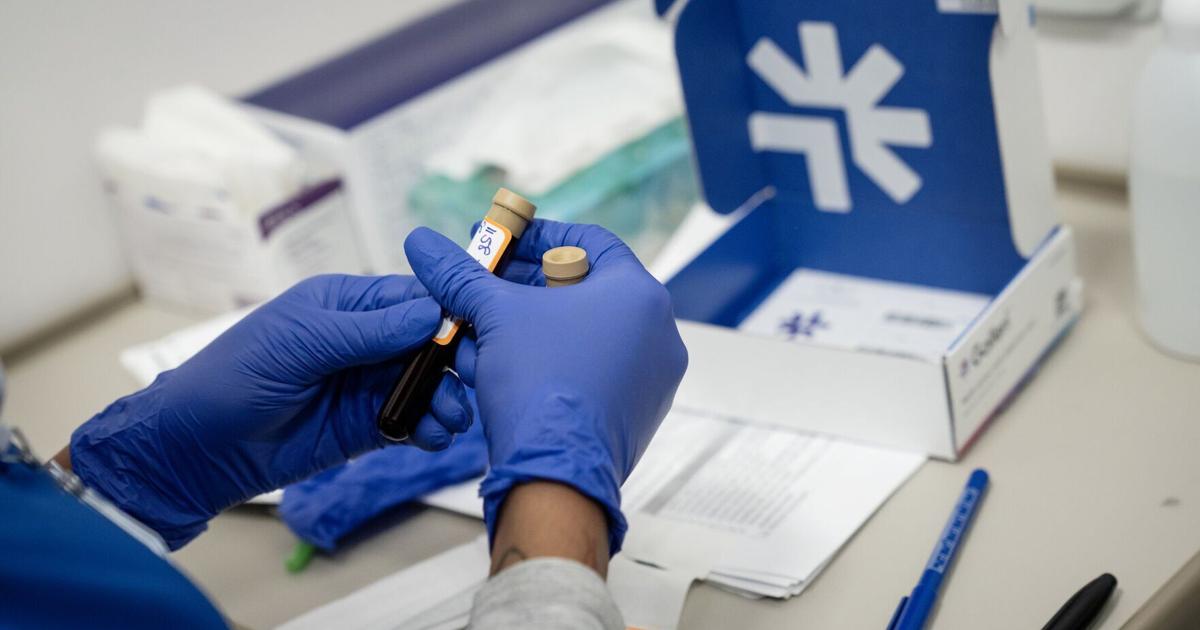Health
Rush University Offers Blood Test for Early Cancer Detection

Rush University System for Health has begun offering the blood test Galleri, designed to detect over 50 types of cancer at early stages. This initiative aims to improve cancer survival rates through early detection, a significant concern given that approximately one in three people will be diagnosed with cancer in their lifetimes. The test is currently priced at $749 and is not covered by most health insurance plans.
Elkhart, Indiana resident Elmer Welter experienced the benefits of early detection firsthand. After receiving a positive result from the Galleri test, he underwent follow-up procedures that confirmed cancer in his throat. Following radiation and chemotherapy treatments throughout 2023, Welter is now cancer-free. “Without that test, I still would have had cancer, but it might not have appeared for another year or more,” he stated. His case underscores the potential impact of early detection on treatment outcomes.
The Galleri test identifies DNA shed by cancer cells in the bloodstream. With its ability to detect cancer signals from more than 50 types of cancer, it also provides information on the possible location of the disease. However, a positive result is not a definitive diagnosis; further testing is required to confirm the presence of cancer. According to a study by Grail, the company that developed Galleri, there is a 43% chance that a positive result indicates actual cancer, and a 0.5% false positive rate exists among those without the disease.
Despite the promising capabilities of Galleri, some healthcare providers remain cautious. Northwestern Medicine has opted not to offer the test widely, citing concerns over its sensitivity and specificity. Feighanne Hathaway, a genetic counselor at UChicago Medicine, expressed worries regarding the disparities in healthcare access due to the test’s out-of-pocket cost. She also emphasized the need for more research, particularly since the test is not yet approved by the U.S. Food and Drug Administration (FDA).
Dr. Lisa Stempel, director of the high-risk cancer screening program at Rush, defended the decision to incorporate the test, highlighting its success in clinical trials. “The goal of all screening is to find cancer early when we can treat it,” she stated, noting the significant number of lives that could potentially be saved through early detection.
The Galleri test is available by prescription and is recommended annually for individuals at higher risk of cancer, particularly those aged 50 and older. Rush University is also extending the option to younger adults with risk factors such as a family history of cancer, smoking, diabetes, or obesity. For those who receive a positive result but are later found not to have cancer, Grail provides a second test free of charge.
Peter Crowell, a 65-year-old resident of Bucktown, was among the first to participate in the testing at Rush. Motivated by his family history of cancer, he opted to pay out-of-pocket for the test. “If I can find out if I have any of those markers, then it will be worth it,” he remarked, illustrating the proactive approach many patients are taking towards their health.
While Rush continues to promote the Galleri test, the healthcare community remains divided. Conversations surrounding its efficacy, accessibility, and the implications of its use in routine screening highlight the ongoing debates in cancer detection methods. As research progresses, including trials with over 380,000 participants, the future of Galleri may shape the landscape of cancer screening and treatment.
In the coming year, Grail plans to submit additional information to the FDA for premarket approval, following the test’s breakthrough device designation. Dr. Joshua Ofman, president of Grail, emphasized the importance of the test in detecting cancers that currently lack effective screening tools. “When you can find cancer early, that is your best chance to cure it,” he stated, reinforcing the significance of innovations in cancer detection.
As the conversation about Galleri unfolds, the balance between innovation, caution, and equitable healthcare remains a critical focus for both patients and providers alike.
-

 Lifestyle3 months ago
Lifestyle3 months agoLibraries Challenge Rising E-Book Costs Amid Growing Demand
-

 Sports3 months ago
Sports3 months agoTyreek Hill Responds to Tua Tagovailoa’s Comments on Team Dynamics
-

 Sports3 months ago
Sports3 months agoLiverpool Secures Agreement to Sign Young Striker Will Wright
-

 Lifestyle3 months ago
Lifestyle3 months agoSave Your Split Tomatoes: Expert Tips for Gardeners
-

 Lifestyle3 months ago
Lifestyle3 months agoPrincess Beatrice’s Daughter Athena Joins Siblings at London Parade
-

 World3 months ago
World3 months agoWinter Storms Lash New South Wales with Snow, Flood Risks
-

 Science3 months ago
Science3 months agoTrump Administration Moves to Repeal Key Climate Regulation
-

 Science2 months ago
Science2 months agoSan Francisco Hosts Unique Contest to Identify “Performative Males”
-

 Business3 months ago
Business3 months agoSoFi Technologies Shares Slip 2% Following Insider Stock Sale
-

 Science3 months ago
Science3 months agoNew Tool Reveals Link Between Horse Coat Condition and Parasites
-

 Sports3 months ago
Sports3 months agoElon Musk Sculpture Travels From Utah to Yosemite National Park
-

 Science3 months ago
Science3 months agoNew Study Confirms Humans Transported Stonehenge Bluestones









